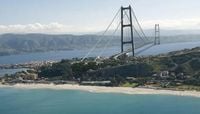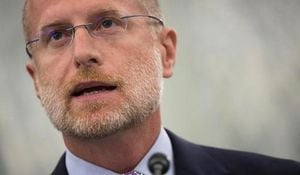The Italian government is moving forward with plans to construct the Messina Strait Bridge, now being reclassified as a military asset to bypass environmental regulations. This shift comes as Eurostat data reveals that Sicily, Calabria, and Campania have some of the lowest employment rates in Europe.
The proposal, sent to the European Commission, aims to include the bridge in the Military Mobility Action Plan, which was approved last year. By designating the bridge as a strategic military infrastructure, the Italian government hopes to sidestep stringent EU environmental laws that had previously hindered the project.
Vicepremier Matteo Salvini, a staunch advocate for the bridge, believes it will create at least 120,000 new jobs and stimulate economic growth in the underdeveloped regions of Southern Italy. "The bridge will be a positive revolution, ensuring development and well-being from South to North," he stated on April 20, 2025, in light of the dismal employment statistics that show Calabria at a mere 44.8% employment rate, Campania at 45.4%, and Sicily at 46.8%.
Salvini's optimism is met with skepticism from opposition leaders. Angelo Bonelli, leader of the Verdi party, criticized the government's strategy, calling it a "folly" and accusing them of fabricating military necessity to circumvent environmental constraints. He remarked, "They have invented military interest to overcome European environmental constraints," highlighting the absurdity of the situation.
Furthermore, Annalisa Corrado from the PD party ridiculed the notion that the bridge could serve NATO, saying, "It would be comical if it weren't tragic." She likened the government's approach to a childhood game, suggesting that Salvini and Prime Minister Giorgia Meloni are reminiscing about playing Risiko, a board game centered around military strategy.
Despite opposition criticism, the government maintains that the bridge is essential for NATO's strategic needs, facilitating the rapid transport of troops and equipment in the event of conflict. The official document submitted to the European Commission states that the bridge would ensure a key infrastructure for the transfer of NATO forces from Northern Europe to the Mediterranean.
In a bid to strengthen their argument, the government claims the bridge will enhance Italy's military capabilities and contribute to the country's defense commitments. They argue that declaring the bridge a military infrastructure will allow for its costs to be included in the national defense budget, aligning with NATO's requests for increased military spending.
However, the proposal has raised concerns regarding its environmental impact. Critics have pointed out that the project lacks necessary seismic verifications, which are crucial for such a large-scale infrastructure. Bonelli has formally warned Cipess, the authority responsible for project approval, against moving forward without proper assessments, labeling the current political maneuvering as a "shameful political force."
Salvini's push for the bridge comes amid a backdrop of rising unemployment in the southern regions, where economic opportunities are scarce. The government's focus on the bridge as a solution to these issues has sparked a heated debate about the priorities of the current administration. While the bridge is seen as a potential economic boon, many question whether the military classification is a genuine necessity or a convenient excuse to bypass regulations.
As the government prepares to open construction sites soon, the implications of this project extend beyond mere infrastructure. The bridge is positioned as a symbol of national ambition and military readiness, yet it simultaneously raises critical questions about environmental stewardship and the balance between development and ecological responsibility.
In conclusion, the Messina Strait Bridge project represents a contentious intersection of economic development, military strategy, and environmental policy. With significant opposition from various political factions, the future of the bridge hangs in the balance as the government seeks to navigate these complex issues.







